Legal Framework and Operations of a Private Limited Company
VerifiedAdded on 2020/01/23
|12
|3486
|743
Report
AI Summary
This report provides a comprehensive overview of the legal aspects of a private limited company, examining its formation, operational requirements, and the responsibilities of directors and shareholders. It details the registration process with Companies House, including the necessary documentation such as the Memorandum and Articles of Association, and outlines the key steps involved in setting up a company. The report covers financial aspects, including the filing of annual accounts, corporation tax obligations, and record-keeping requirements. It also highlights the duties and liabilities of company directors, emphasizing the importance of acting within their powers, promoting the company's success, and avoiding conflicts of interest. Furthermore, the report discusses the legal and financial responsibilities associated with running a limited company, including the annual return, financial record maintenance, and dividend declarations. The report concludes by presenting a case study of Phoenix Properties (Ltd), a private limited company, and its purpose of simplifying property acquisition. The report aims to provide a practical guide for individuals starting or managing a private limited company, ensuring compliance with relevant laws and regulations.
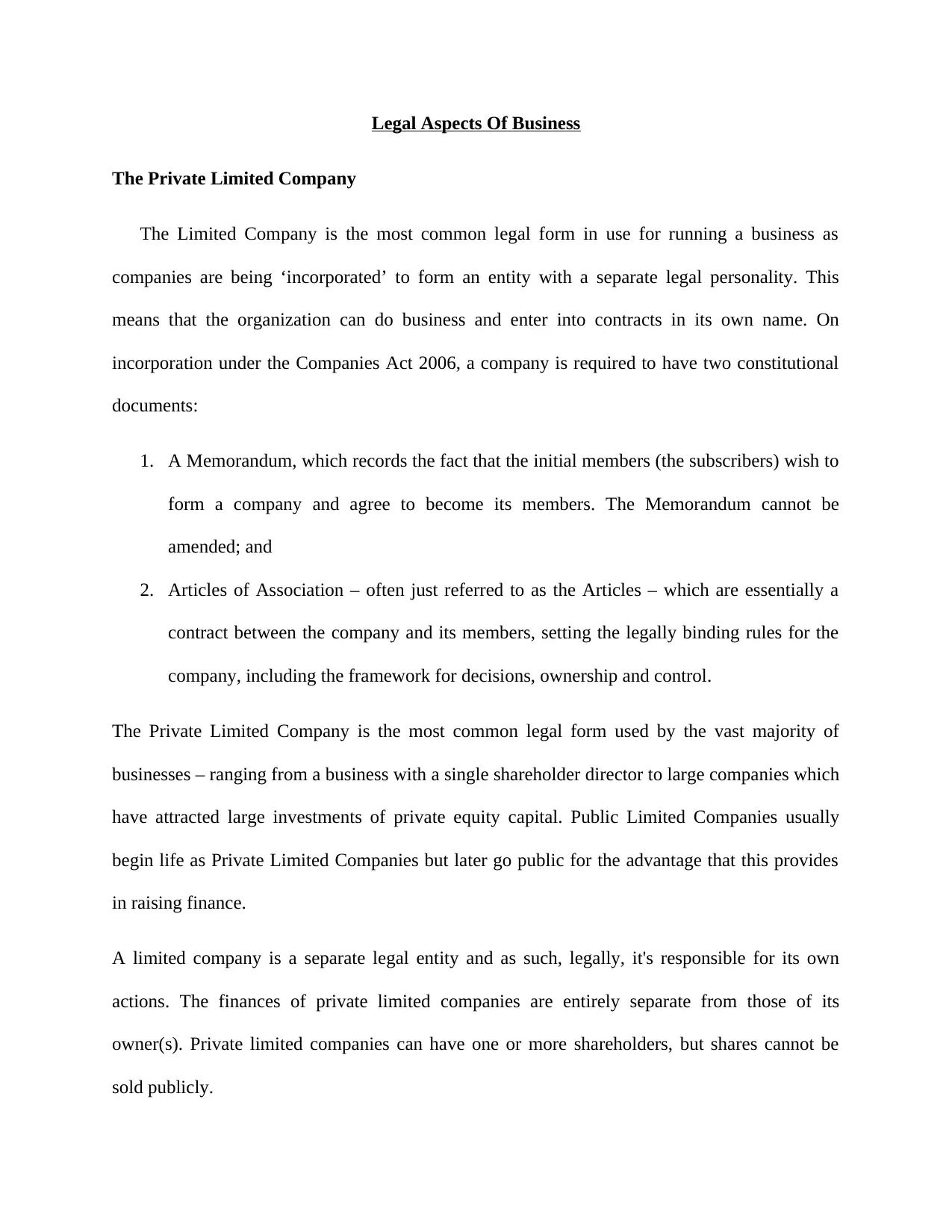
Legal Aspects Of Business
The Private Limited Company
The Limited Company is the most common legal form in use for running a business as
companies are being ‘incorporated’ to form an entity with a separate legal personality. This
means that the organization can do business and enter into contracts in its own name. On
incorporation under the Companies Act 2006, a company is required to have two constitutional
documents:
1. A Memorandum, which records the fact that the initial members (the subscribers) wish to
form a company and agree to become its members. The Memorandum cannot be
amended; and
2. Articles of Association – often just referred to as the Articles – which are essentially a
contract between the company and its members, setting the legally binding rules for the
company, including the framework for decisions, ownership and control.
The Private Limited Company is the most common legal form used by the vast majority of
businesses – ranging from a business with a single shareholder director to large companies which
have attracted large investments of private equity capital. Public Limited Companies usually
begin life as Private Limited Companies but later go public for the advantage that this provides
in raising finance.
A limited company is a separate legal entity and as such, legally, it's responsible for its own
actions. The finances of private limited companies are entirely separate from those of its
owner(s). Private limited companies can have one or more shareholders, but shares cannot be
sold publicly.
The Private Limited Company
The Limited Company is the most common legal form in use for running a business as
companies are being ‘incorporated’ to form an entity with a separate legal personality. This
means that the organization can do business and enter into contracts in its own name. On
incorporation under the Companies Act 2006, a company is required to have two constitutional
documents:
1. A Memorandum, which records the fact that the initial members (the subscribers) wish to
form a company and agree to become its members. The Memorandum cannot be
amended; and
2. Articles of Association – often just referred to as the Articles – which are essentially a
contract between the company and its members, setting the legally binding rules for the
company, including the framework for decisions, ownership and control.
The Private Limited Company is the most common legal form used by the vast majority of
businesses – ranging from a business with a single shareholder director to large companies which
have attracted large investments of private equity capital. Public Limited Companies usually
begin life as Private Limited Companies but later go public for the advantage that this provides
in raising finance.
A limited company is a separate legal entity and as such, legally, it's responsible for its own
actions. The finances of private limited companies are entirely separate from those of its
owner(s). Private limited companies can have one or more shareholders, but shares cannot be
sold publicly.
Paraphrase This Document
Need a fresh take? Get an instant paraphrase of this document with our AI Paraphraser
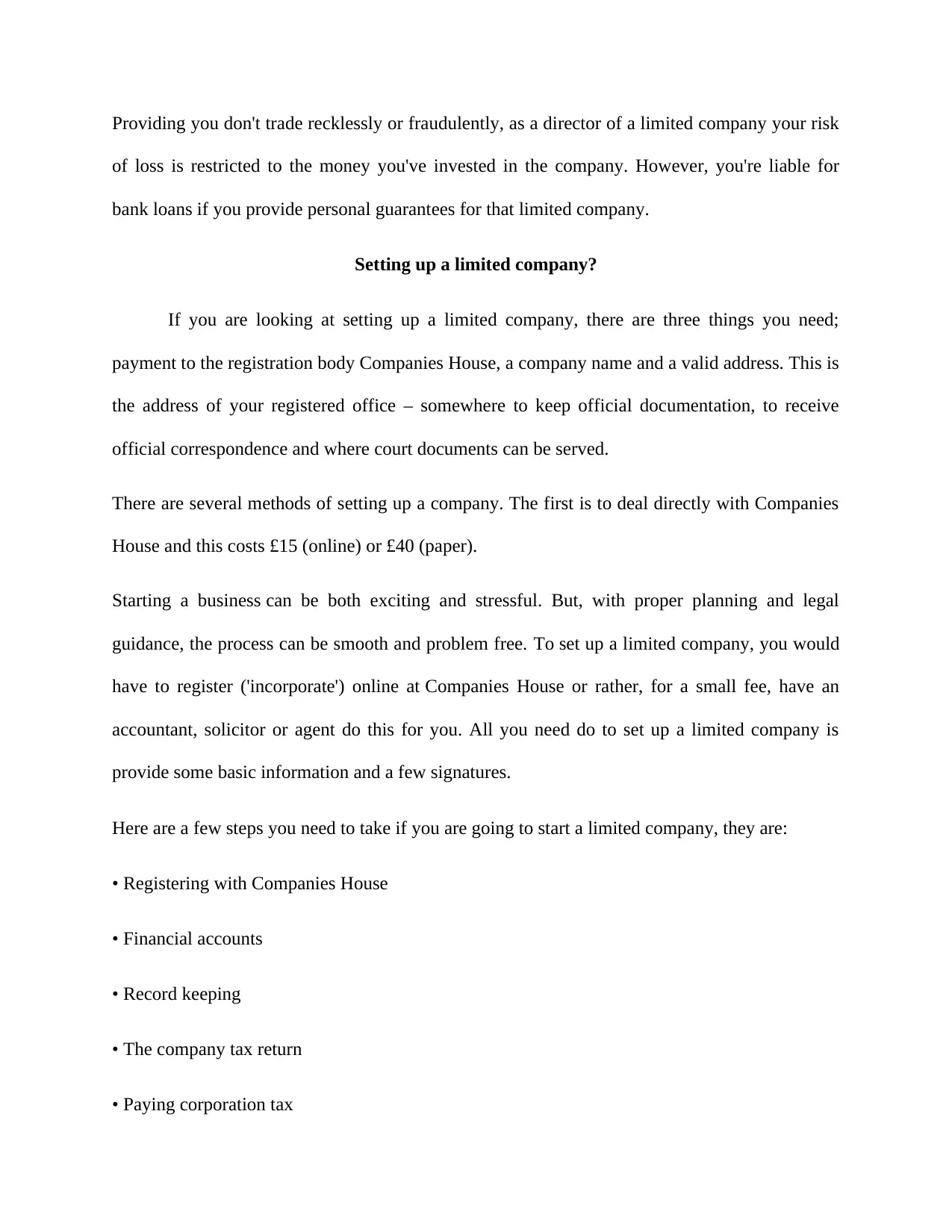
Providing you don't trade recklessly or fraudulently, as a director of a limited company your risk
of loss is restricted to the money you've invested in the company. However, you're liable for
bank loans if you provide personal guarantees for that limited company.
Setting up a limited company?
If you are looking at setting up a limited company, there are three things you need;
payment to the registration body Companies House, a company name and a valid address. This is
the address of your registered office – somewhere to keep official documentation, to receive
official correspondence and where court documents can be served.
There are several methods of setting up a company. The first is to deal directly with Companies
House and this costs £15 (online) or £40 (paper).
Starting a business can be both exciting and stressful. But, with proper planning and legal
guidance, the process can be smooth and problem free. To set up a limited company, you would
have to register ('incorporate') online at Companies House or rather, for a small fee, have an
accountant, solicitor or agent do this for you. All you need do to set up a limited company is
provide some basic information and a few signatures.
Here are a few steps you need to take if you are going to start a limited company, they are:
• Registering with Companies House
• Financial accounts
• Record keeping
• The company tax return
• Paying corporation tax
of loss is restricted to the money you've invested in the company. However, you're liable for
bank loans if you provide personal guarantees for that limited company.
Setting up a limited company?
If you are looking at setting up a limited company, there are three things you need;
payment to the registration body Companies House, a company name and a valid address. This is
the address of your registered office – somewhere to keep official documentation, to receive
official correspondence and where court documents can be served.
There are several methods of setting up a company. The first is to deal directly with Companies
House and this costs £15 (online) or £40 (paper).
Starting a business can be both exciting and stressful. But, with proper planning and legal
guidance, the process can be smooth and problem free. To set up a limited company, you would
have to register ('incorporate') online at Companies House or rather, for a small fee, have an
accountant, solicitor or agent do this for you. All you need do to set up a limited company is
provide some basic information and a few signatures.
Here are a few steps you need to take if you are going to start a limited company, they are:
• Registering with Companies House
• Financial accounts
• Record keeping
• The company tax return
• Paying corporation tax
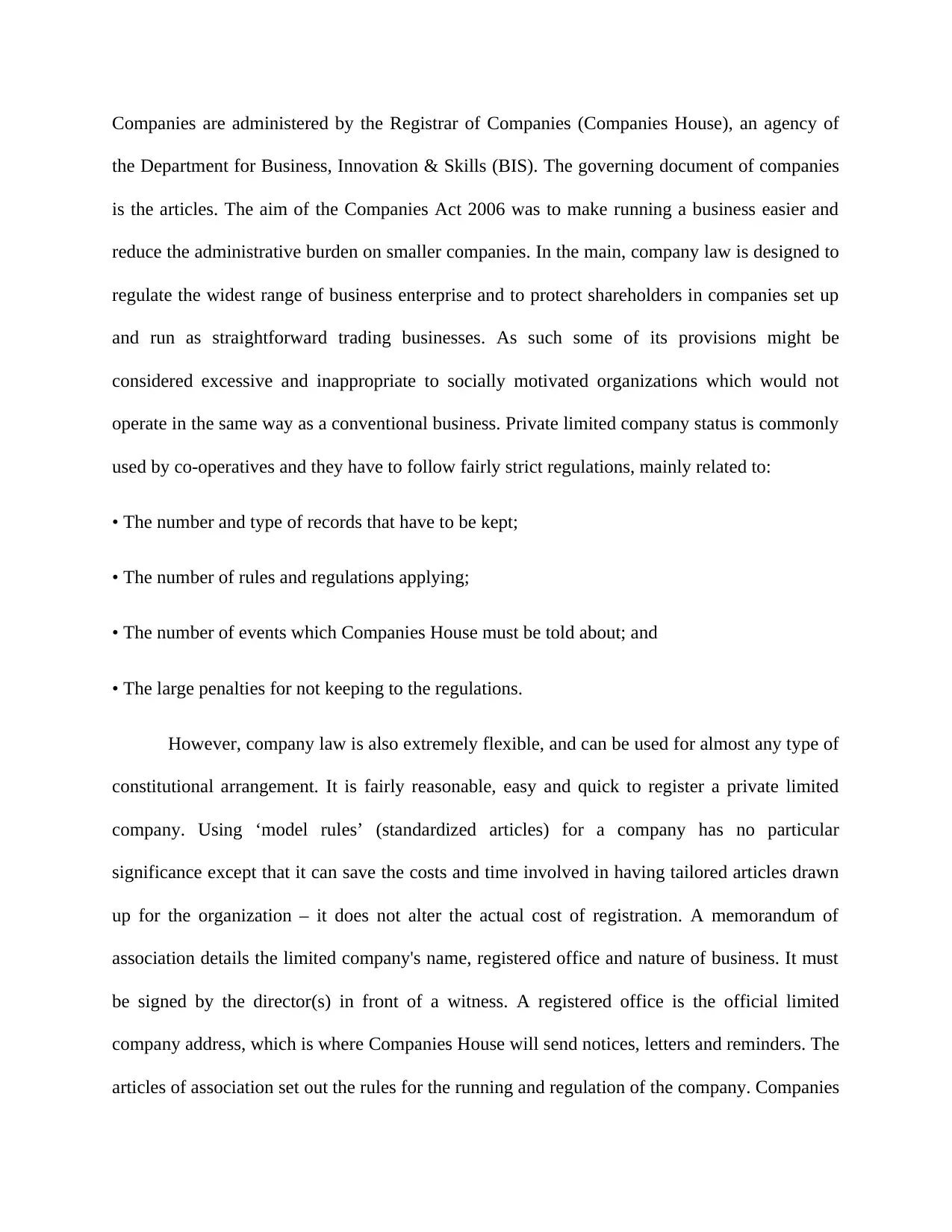
Companies are administered by the Registrar of Companies (Companies House), an agency of
the Department for Business, Innovation & Skills (BIS). The governing document of companies
is the articles. The aim of the Companies Act 2006 was to make running a business easier and
reduce the administrative burden on smaller companies. In the main, company law is designed to
regulate the widest range of business enterprise and to protect shareholders in companies set up
and run as straightforward trading businesses. As such some of its provisions might be
considered excessive and inappropriate to socially motivated organizations which would not
operate in the same way as a conventional business. Private limited company status is commonly
used by co-operatives and they have to follow fairly strict regulations, mainly related to:
• The number and type of records that have to be kept;
• The number of rules and regulations applying;
• The number of events which Companies House must be told about; and
• The large penalties for not keeping to the regulations.
However, company law is also extremely flexible, and can be used for almost any type of
constitutional arrangement. It is fairly reasonable, easy and quick to register a private limited
company. Using ‘model rules’ (standardized articles) for a company has no particular
significance except that it can save the costs and time involved in having tailored articles drawn
up for the organization – it does not alter the actual cost of registration. A memorandum of
association details the limited company's name, registered office and nature of business. It must
be signed by the director(s) in front of a witness. A registered office is the official limited
company address, which is where Companies House will send notices, letters and reminders. The
articles of association set out the rules for the running and regulation of the company. Companies
the Department for Business, Innovation & Skills (BIS). The governing document of companies
is the articles. The aim of the Companies Act 2006 was to make running a business easier and
reduce the administrative burden on smaller companies. In the main, company law is designed to
regulate the widest range of business enterprise and to protect shareholders in companies set up
and run as straightforward trading businesses. As such some of its provisions might be
considered excessive and inappropriate to socially motivated organizations which would not
operate in the same way as a conventional business. Private limited company status is commonly
used by co-operatives and they have to follow fairly strict regulations, mainly related to:
• The number and type of records that have to be kept;
• The number of rules and regulations applying;
• The number of events which Companies House must be told about; and
• The large penalties for not keeping to the regulations.
However, company law is also extremely flexible, and can be used for almost any type of
constitutional arrangement. It is fairly reasonable, easy and quick to register a private limited
company. Using ‘model rules’ (standardized articles) for a company has no particular
significance except that it can save the costs and time involved in having tailored articles drawn
up for the organization – it does not alter the actual cost of registration. A memorandum of
association details the limited company's name, registered office and nature of business. It must
be signed by the director(s) in front of a witness. A registered office is the official limited
company address, which is where Companies House will send notices, letters and reminders. The
articles of association set out the rules for the running and regulation of the company. Companies
⊘ This is a preview!⊘
Do you want full access?
Subscribe today to unlock all pages.

Trusted by 1+ million students worldwide
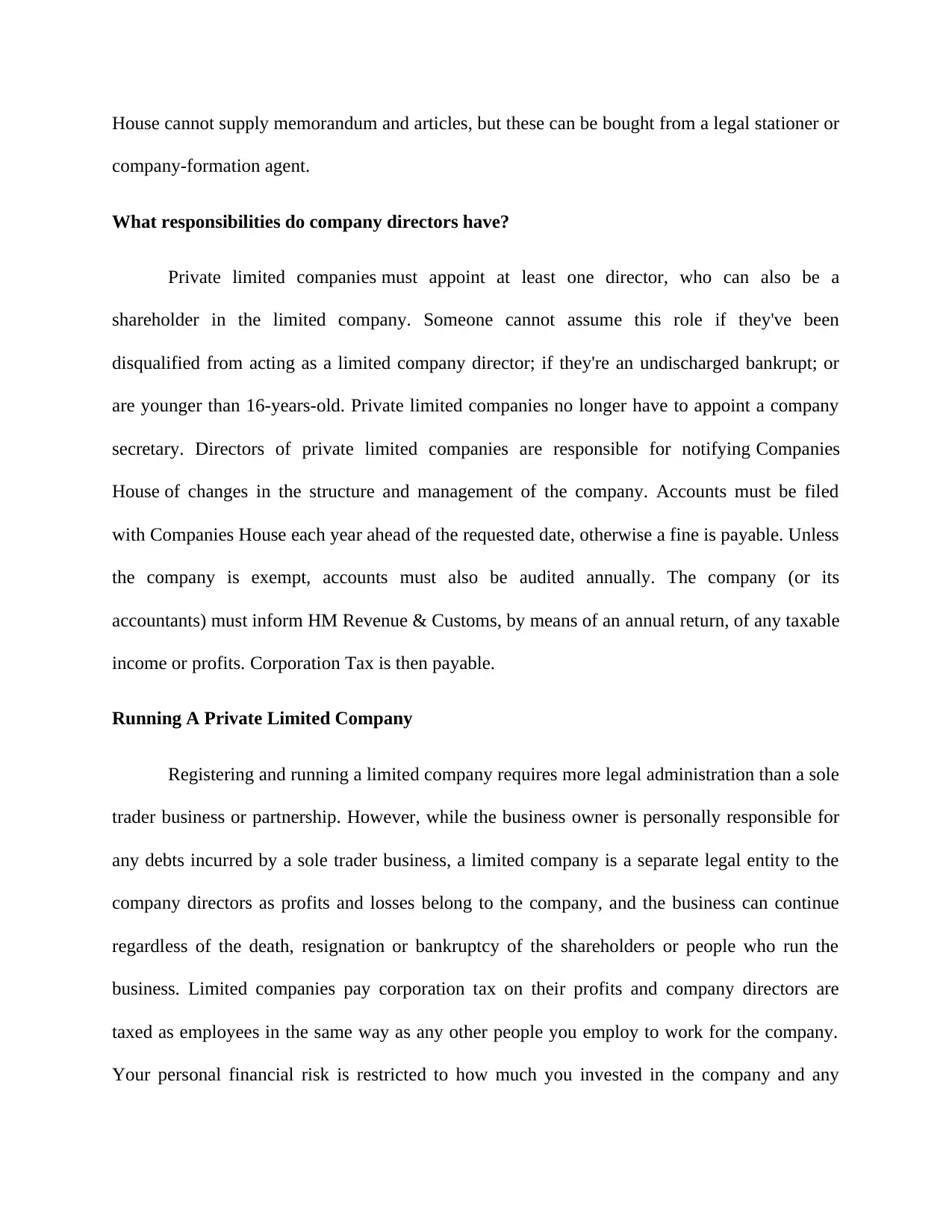
House cannot supply memorandum and articles, but these can be bought from a legal stationer or
company-formation agent.
What responsibilities do company directors have?
Private limited companies must appoint at least one director, who can also be a
shareholder in the limited company. Someone cannot assume this role if they've been
disqualified from acting as a limited company director; if they're an undischarged bankrupt; or
are younger than 16-years-old. Private limited companies no longer have to appoint a company
secretary. Directors of private limited companies are responsible for notifying Companies
House of changes in the structure and management of the company. Accounts must be filed
with Companies House each year ahead of the requested date, otherwise a fine is payable. Unless
the company is exempt, accounts must also be audited annually. The company (or its
accountants) must inform HM Revenue & Customs, by means of an annual return, of any taxable
income or profits. Corporation Tax is then payable.
Running A Private Limited Company
Registering and running a limited company requires more legal administration than a sole
trader business or partnership. However, while the business owner is personally responsible for
any debts incurred by a sole trader business, a limited company is a separate legal entity to the
company directors as profits and losses belong to the company, and the business can continue
regardless of the death, resignation or bankruptcy of the shareholders or people who run the
business. Limited companies pay corporation tax on their profits and company directors are
taxed as employees in the same way as any other people you employ to work for the company.
Your personal financial risk is restricted to how much you invested in the company and any
company-formation agent.
What responsibilities do company directors have?
Private limited companies must appoint at least one director, who can also be a
shareholder in the limited company. Someone cannot assume this role if they've been
disqualified from acting as a limited company director; if they're an undischarged bankrupt; or
are younger than 16-years-old. Private limited companies no longer have to appoint a company
secretary. Directors of private limited companies are responsible for notifying Companies
House of changes in the structure and management of the company. Accounts must be filed
with Companies House each year ahead of the requested date, otherwise a fine is payable. Unless
the company is exempt, accounts must also be audited annually. The company (or its
accountants) must inform HM Revenue & Customs, by means of an annual return, of any taxable
income or profits. Corporation Tax is then payable.
Running A Private Limited Company
Registering and running a limited company requires more legal administration than a sole
trader business or partnership. However, while the business owner is personally responsible for
any debts incurred by a sole trader business, a limited company is a separate legal entity to the
company directors as profits and losses belong to the company, and the business can continue
regardless of the death, resignation or bankruptcy of the shareholders or people who run the
business. Limited companies pay corporation tax on their profits and company directors are
taxed as employees in the same way as any other people you employ to work for the company.
Your personal financial risk is restricted to how much you invested in the company and any
Paraphrase This Document
Need a fresh take? Get an instant paraphrase of this document with our AI Paraphraser
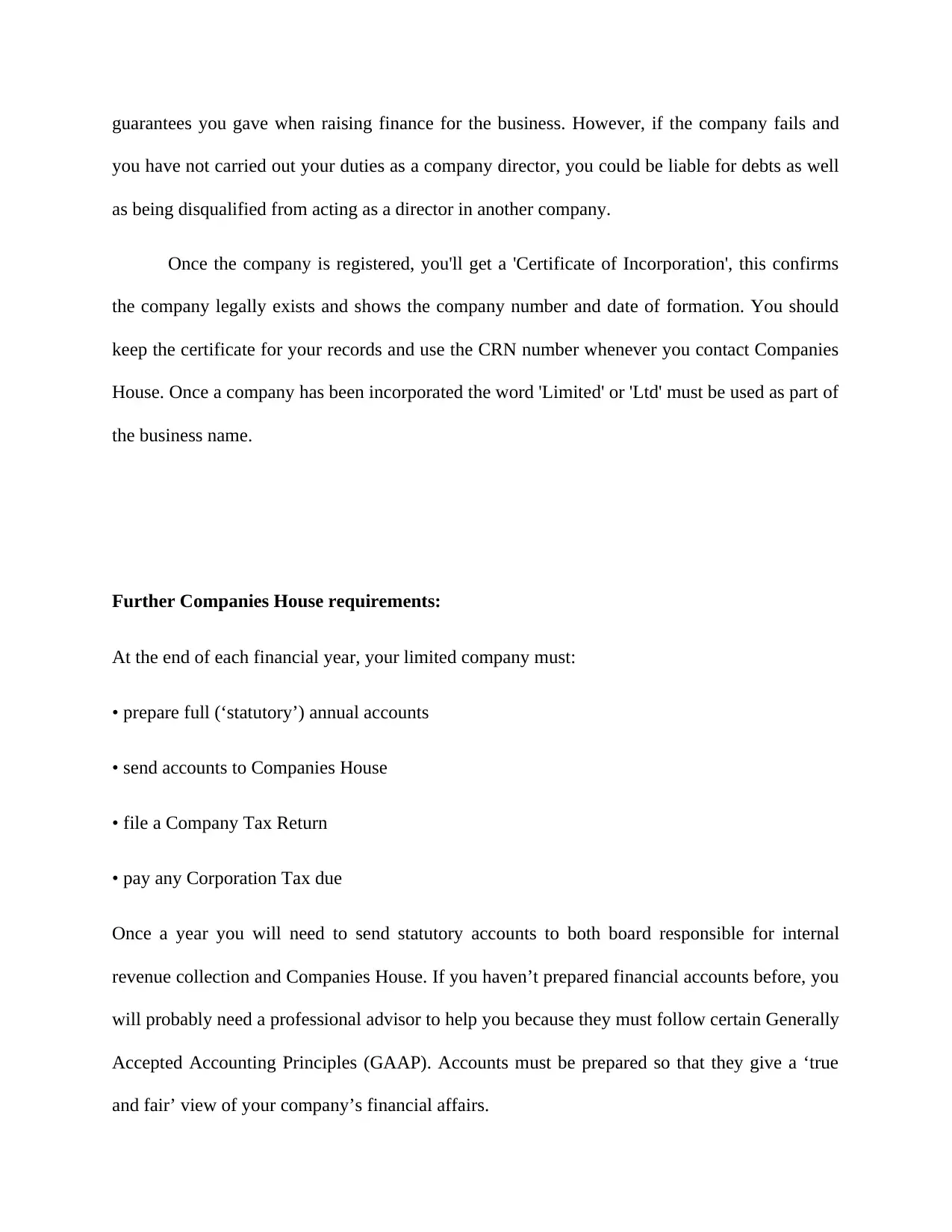
guarantees you gave when raising finance for the business. However, if the company fails and
you have not carried out your duties as a company director, you could be liable for debts as well
as being disqualified from acting as a director in another company.
Once the company is registered, you'll get a 'Certificate of Incorporation', this confirms
the company legally exists and shows the company number and date of formation. You should
keep the certificate for your records and use the CRN number whenever you contact Companies
House. Once a company has been incorporated the word 'Limited' or 'Ltd' must be used as part of
the business name.
Further Companies House requirements:
At the end of each financial year, your limited company must:
• prepare full (‘statutory’) annual accounts
• send accounts to Companies House
• file a Company Tax Return
• pay any Corporation Tax due
Once a year you will need to send statutory accounts to both board responsible for internal
revenue collection and Companies House. If you haven’t prepared financial accounts before, you
will probably need a professional advisor to help you because they must follow certain Generally
Accepted Accounting Principles (GAAP). Accounts must be prepared so that they give a ‘true
and fair’ view of your company’s financial affairs.
you have not carried out your duties as a company director, you could be liable for debts as well
as being disqualified from acting as a director in another company.
Once the company is registered, you'll get a 'Certificate of Incorporation', this confirms
the company legally exists and shows the company number and date of formation. You should
keep the certificate for your records and use the CRN number whenever you contact Companies
House. Once a company has been incorporated the word 'Limited' or 'Ltd' must be used as part of
the business name.
Further Companies House requirements:
At the end of each financial year, your limited company must:
• prepare full (‘statutory’) annual accounts
• send accounts to Companies House
• file a Company Tax Return
• pay any Corporation Tax due
Once a year you will need to send statutory accounts to both board responsible for internal
revenue collection and Companies House. If you haven’t prepared financial accounts before, you
will probably need a professional advisor to help you because they must follow certain Generally
Accepted Accounting Principles (GAAP). Accounts must be prepared so that they give a ‘true
and fair’ view of your company’s financial affairs.
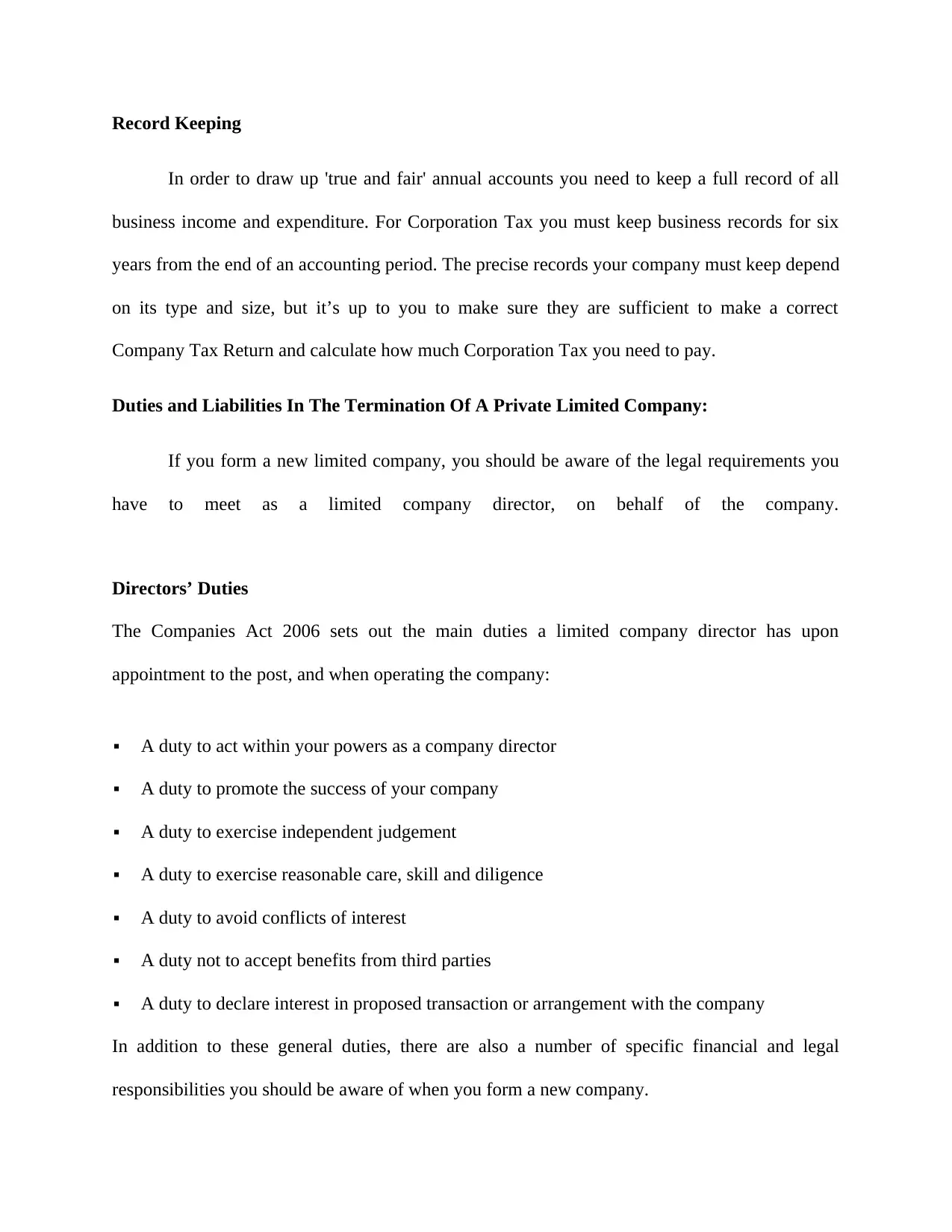
Record Keeping
In order to draw up 'true and fair' annual accounts you need to keep a full record of all
business income and expenditure. For Corporation Tax you must keep business records for six
years from the end of an accounting period. The precise records your company must keep depend
on its type and size, but it’s up to you to make sure they are sufficient to make a correct
Company Tax Return and calculate how much Corporation Tax you need to pay.
Duties and Liabilities In The Termination Of A Private Limited Company:
If you form a new limited company, you should be aware of the legal requirements you
have to meet as a limited company director, on behalf of the company.
Directors’ Duties
The Companies Act 2006 sets out the main duties a limited company director has upon
appointment to the post, and when operating the company:
A duty to act within your powers as a company director
A duty to promote the success of your company
A duty to exercise independent judgement
A duty to exercise reasonable care, skill and diligence
A duty to avoid conflicts of interest
A duty not to accept benefits from third parties
A duty to declare interest in proposed transaction or arrangement with the company
In addition to these general duties, there are also a number of specific financial and legal
responsibilities you should be aware of when you form a new company.
In order to draw up 'true and fair' annual accounts you need to keep a full record of all
business income and expenditure. For Corporation Tax you must keep business records for six
years from the end of an accounting period. The precise records your company must keep depend
on its type and size, but it’s up to you to make sure they are sufficient to make a correct
Company Tax Return and calculate how much Corporation Tax you need to pay.
Duties and Liabilities In The Termination Of A Private Limited Company:
If you form a new limited company, you should be aware of the legal requirements you
have to meet as a limited company director, on behalf of the company.
Directors’ Duties
The Companies Act 2006 sets out the main duties a limited company director has upon
appointment to the post, and when operating the company:
A duty to act within your powers as a company director
A duty to promote the success of your company
A duty to exercise independent judgement
A duty to exercise reasonable care, skill and diligence
A duty to avoid conflicts of interest
A duty not to accept benefits from third parties
A duty to declare interest in proposed transaction or arrangement with the company
In addition to these general duties, there are also a number of specific financial and legal
responsibilities you should be aware of when you form a new company.
⊘ This is a preview!⊘
Do you want full access?
Subscribe today to unlock all pages.

Trusted by 1+ million students worldwide
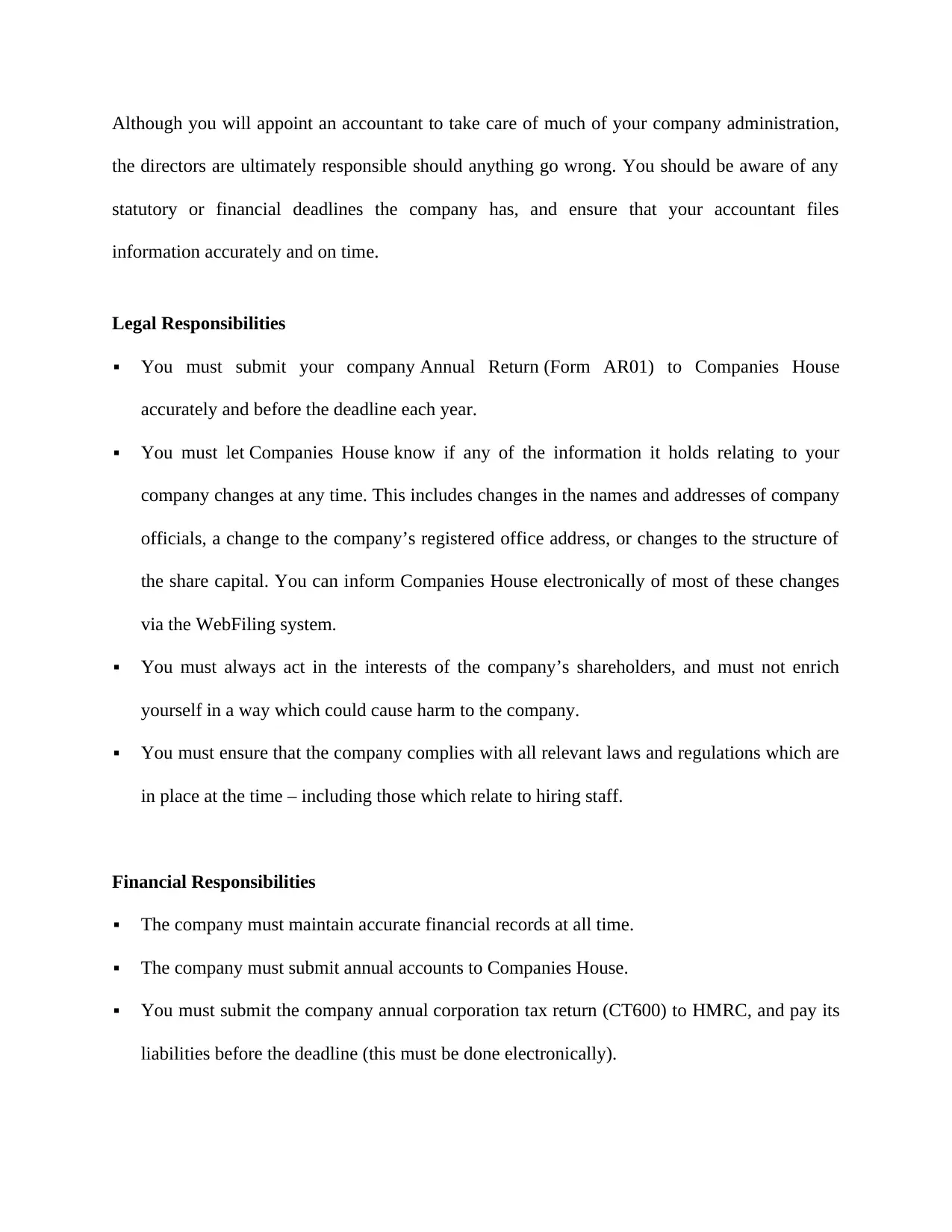
Although you will appoint an accountant to take care of much of your company administration,
the directors are ultimately responsible should anything go wrong. You should be aware of any
statutory or financial deadlines the company has, and ensure that your accountant files
information accurately and on time.
Legal Responsibilities
You must submit your company Annual Return (Form AR01) to Companies House
accurately and before the deadline each year.
You must let Companies House know if any of the information it holds relating to your
company changes at any time. This includes changes in the names and addresses of company
officials, a change to the company’s registered office address, or changes to the structure of
the share capital. You can inform Companies House electronically of most of these changes
via the WebFiling system.
You must always act in the interests of the company’s shareholders, and must not enrich
yourself in a way which could cause harm to the company.
You must ensure that the company complies with all relevant laws and regulations which are
in place at the time – including those which relate to hiring staff.
Financial Responsibilities
The company must maintain accurate financial records at all time.
The company must submit annual accounts to Companies House.
You must submit the company annual corporation tax return (CT600) to HMRC, and pay its
liabilities before the deadline (this must be done electronically).
the directors are ultimately responsible should anything go wrong. You should be aware of any
statutory or financial deadlines the company has, and ensure that your accountant files
information accurately and on time.
Legal Responsibilities
You must submit your company Annual Return (Form AR01) to Companies House
accurately and before the deadline each year.
You must let Companies House know if any of the information it holds relating to your
company changes at any time. This includes changes in the names and addresses of company
officials, a change to the company’s registered office address, or changes to the structure of
the share capital. You can inform Companies House electronically of most of these changes
via the WebFiling system.
You must always act in the interests of the company’s shareholders, and must not enrich
yourself in a way which could cause harm to the company.
You must ensure that the company complies with all relevant laws and regulations which are
in place at the time – including those which relate to hiring staff.
Financial Responsibilities
The company must maintain accurate financial records at all time.
The company must submit annual accounts to Companies House.
You must submit the company annual corporation tax return (CT600) to HMRC, and pay its
liabilities before the deadline (this must be done electronically).
Paraphrase This Document
Need a fresh take? Get an instant paraphrase of this document with our AI Paraphraser
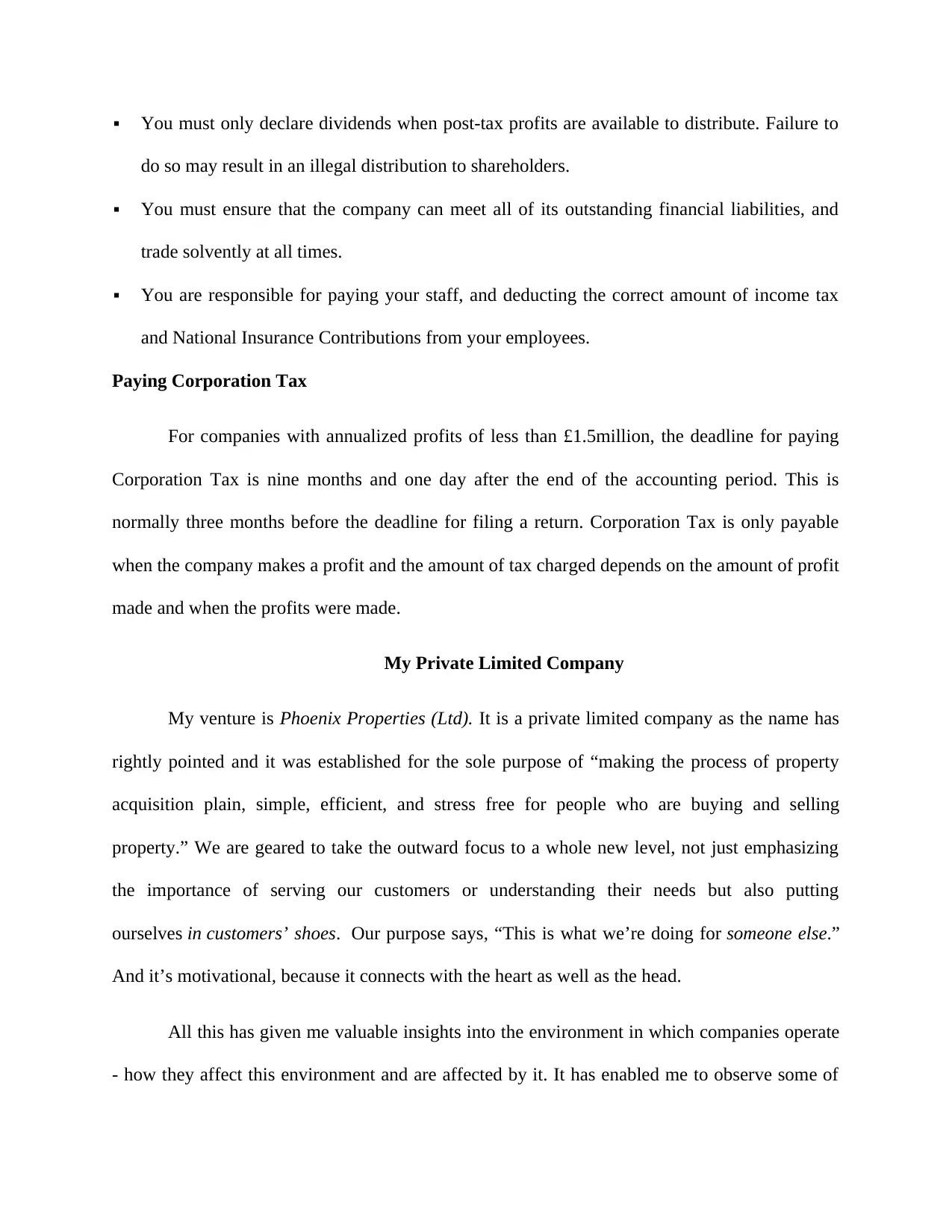
You must only declare dividends when post-tax profits are available to distribute. Failure to
do so may result in an illegal distribution to shareholders.
You must ensure that the company can meet all of its outstanding financial liabilities, and
trade solvently at all times.
You are responsible for paying your staff, and deducting the correct amount of income tax
and National Insurance Contributions from your employees.
Paying Corporation Tax
For companies with annualized profits of less than £1.5million, the deadline for paying
Corporation Tax is nine months and one day after the end of the accounting period. This is
normally three months before the deadline for filing a return. Corporation Tax is only payable
when the company makes a profit and the amount of tax charged depends on the amount of profit
made and when the profits were made.
My Private Limited Company
My venture is Phoenix Properties (Ltd). It is a private limited company as the name has
rightly pointed and it was established for the sole purpose of “making the process of property
acquisition plain, simple, efficient, and stress free for people who are buying and selling
property.” We are geared to take the outward focus to a whole new level, not just emphasizing
the importance of serving our customers or understanding their needs but also putting
ourselves in customers’ shoes. Our purpose says, “This is what we’re doing for someone else.”
And it’s motivational, because it connects with the heart as well as the head.
All this has given me valuable insights into the environment in which companies operate
- how they affect this environment and are affected by it. It has enabled me to observe some of
do so may result in an illegal distribution to shareholders.
You must ensure that the company can meet all of its outstanding financial liabilities, and
trade solvently at all times.
You are responsible for paying your staff, and deducting the correct amount of income tax
and National Insurance Contributions from your employees.
Paying Corporation Tax
For companies with annualized profits of less than £1.5million, the deadline for paying
Corporation Tax is nine months and one day after the end of the accounting period. This is
normally three months before the deadline for filing a return. Corporation Tax is only payable
when the company makes a profit and the amount of tax charged depends on the amount of profit
made and when the profits were made.
My Private Limited Company
My venture is Phoenix Properties (Ltd). It is a private limited company as the name has
rightly pointed and it was established for the sole purpose of “making the process of property
acquisition plain, simple, efficient, and stress free for people who are buying and selling
property.” We are geared to take the outward focus to a whole new level, not just emphasizing
the importance of serving our customers or understanding their needs but also putting
ourselves in customers’ shoes. Our purpose says, “This is what we’re doing for someone else.”
And it’s motivational, because it connects with the heart as well as the head.
All this has given me valuable insights into the environment in which companies operate
- how they affect this environment and are affected by it. It has enabled me to observe some of
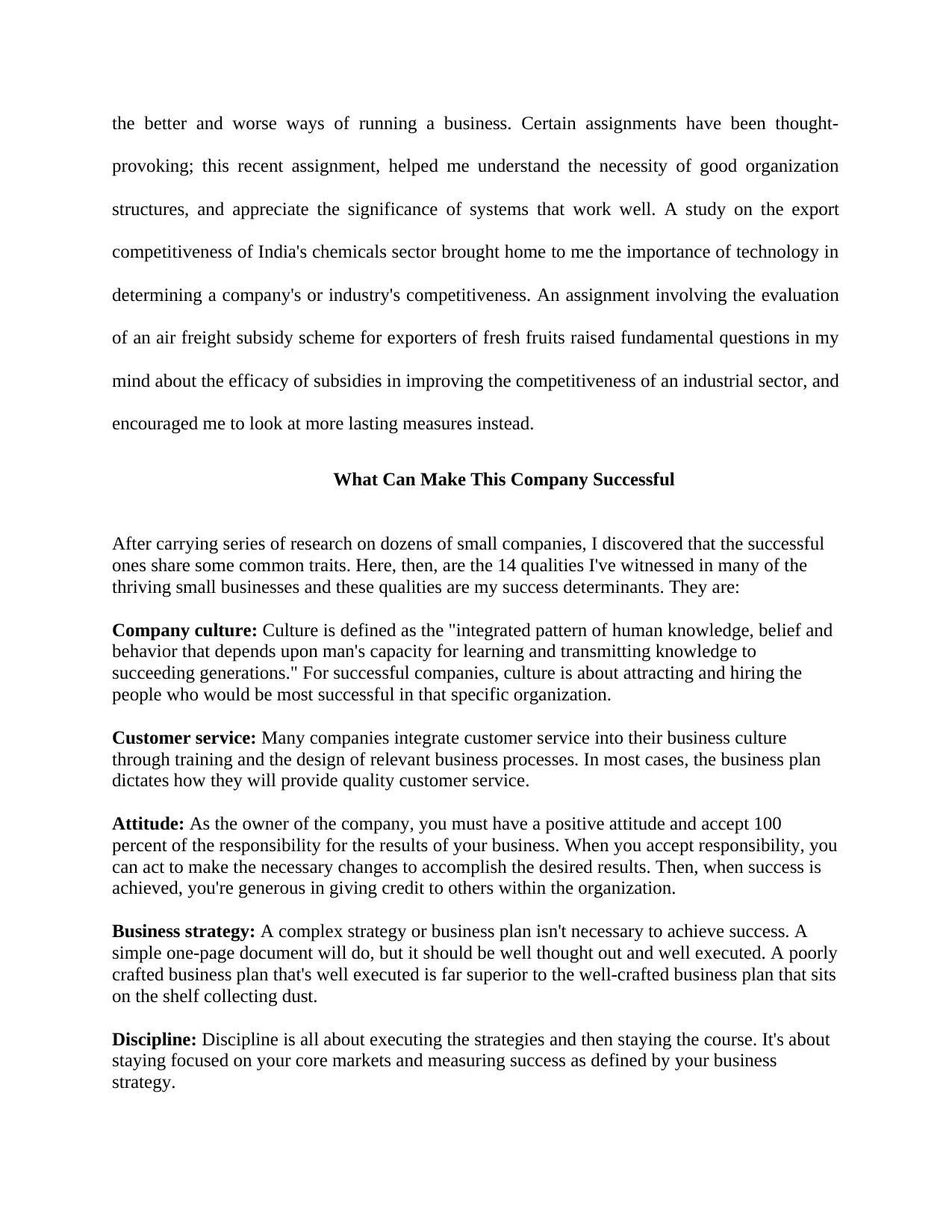
the better and worse ways of running a business. Certain assignments have been thought-
provoking; this recent assignment, helped me understand the necessity of good organization
structures, and appreciate the significance of systems that work well. A study on the export
competitiveness of India's chemicals sector brought home to me the importance of technology in
determining a company's or industry's competitiveness. An assignment involving the evaluation
of an air freight subsidy scheme for exporters of fresh fruits raised fundamental questions in my
mind about the efficacy of subsidies in improving the competitiveness of an industrial sector, and
encouraged me to look at more lasting measures instead.
What Can Make This Company Successful
After carrying series of research on dozens of small companies, I discovered that the successful
ones share some common traits. Here, then, are the 14 qualities I've witnessed in many of the
thriving small businesses and these qualities are my success determinants. They are:
Company culture: Culture is defined as the "integrated pattern of human knowledge, belief and
behavior that depends upon man's capacity for learning and transmitting knowledge to
succeeding generations." For successful companies, culture is about attracting and hiring the
people who would be most successful in that specific organization.
Customer service: Many companies integrate customer service into their business culture
through training and the design of relevant business processes. In most cases, the business plan
dictates how they will provide quality customer service.
Attitude: As the owner of the company, you must have a positive attitude and accept 100
percent of the responsibility for the results of your business. When you accept responsibility, you
can act to make the necessary changes to accomplish the desired results. Then, when success is
achieved, you're generous in giving credit to others within the organization.
Business strategy: A complex strategy or business plan isn't necessary to achieve success. A
simple one-page document will do, but it should be well thought out and well executed. A poorly
crafted business plan that's well executed is far superior to the well-crafted business plan that sits
on the shelf collecting dust.
Discipline: Discipline is all about executing the strategies and then staying the course. It's about
staying focused on your core markets and measuring success as defined by your business
strategy.
provoking; this recent assignment, helped me understand the necessity of good organization
structures, and appreciate the significance of systems that work well. A study on the export
competitiveness of India's chemicals sector brought home to me the importance of technology in
determining a company's or industry's competitiveness. An assignment involving the evaluation
of an air freight subsidy scheme for exporters of fresh fruits raised fundamental questions in my
mind about the efficacy of subsidies in improving the competitiveness of an industrial sector, and
encouraged me to look at more lasting measures instead.
What Can Make This Company Successful
After carrying series of research on dozens of small companies, I discovered that the successful
ones share some common traits. Here, then, are the 14 qualities I've witnessed in many of the
thriving small businesses and these qualities are my success determinants. They are:
Company culture: Culture is defined as the "integrated pattern of human knowledge, belief and
behavior that depends upon man's capacity for learning and transmitting knowledge to
succeeding generations." For successful companies, culture is about attracting and hiring the
people who would be most successful in that specific organization.
Customer service: Many companies integrate customer service into their business culture
through training and the design of relevant business processes. In most cases, the business plan
dictates how they will provide quality customer service.
Attitude: As the owner of the company, you must have a positive attitude and accept 100
percent of the responsibility for the results of your business. When you accept responsibility, you
can act to make the necessary changes to accomplish the desired results. Then, when success is
achieved, you're generous in giving credit to others within the organization.
Business strategy: A complex strategy or business plan isn't necessary to achieve success. A
simple one-page document will do, but it should be well thought out and well executed. A poorly
crafted business plan that's well executed is far superior to the well-crafted business plan that sits
on the shelf collecting dust.
Discipline: Discipline is all about executing the strategies and then staying the course. It's about
staying focused on your core markets and measuring success as defined by your business
strategy.
⊘ This is a preview!⊘
Do you want full access?
Subscribe today to unlock all pages.

Trusted by 1+ million students worldwide
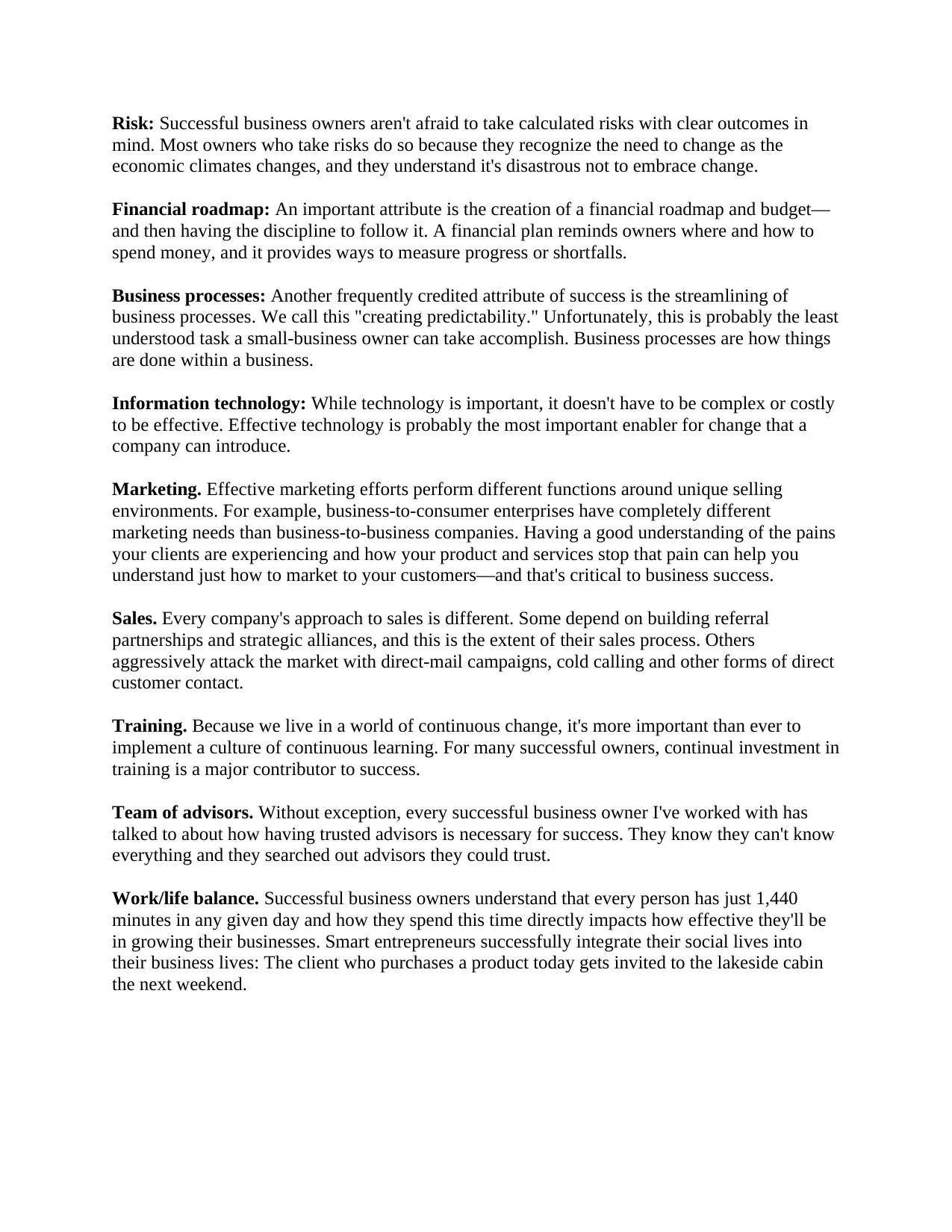
Risk: Successful business owners aren't afraid to take calculated risks with clear outcomes in
mind. Most owners who take risks do so because they recognize the need to change as the
economic climates changes, and they understand it's disastrous not to embrace change.
Financial roadmap: An important attribute is the creation of a financial roadmap and budget—
and then having the discipline to follow it. A financial plan reminds owners where and how to
spend money, and it provides ways to measure progress or shortfalls.
Business processes: Another frequently credited attribute of success is the streamlining of
business processes. We call this "creating predictability." Unfortunately, this is probably the least
understood task a small-business owner can take accomplish. Business processes are how things
are done within a business.
Information technology: While technology is important, it doesn't have to be complex or costly
to be effective. Effective technology is probably the most important enabler for change that a
company can introduce.
Marketing. Effective marketing efforts perform different functions around unique selling
environments. For example, business-to-consumer enterprises have completely different
marketing needs than business-to-business companies. Having a good understanding of the pains
your clients are experiencing and how your product and services stop that pain can help you
understand just how to market to your customers—and that's critical to business success.
Sales. Every company's approach to sales is different. Some depend on building referral
partnerships and strategic alliances, and this is the extent of their sales process. Others
aggressively attack the market with direct-mail campaigns, cold calling and other forms of direct
customer contact.
Training. Because we live in a world of continuous change, it's more important than ever to
implement a culture of continuous learning. For many successful owners, continual investment in
training is a major contributor to success.
Team of advisors. Without exception, every successful business owner I've worked with has
talked to about how having trusted advisors is necessary for success. They know they can't know
everything and they searched out advisors they could trust.
Work/life balance. Successful business owners understand that every person has just 1,440
minutes in any given day and how they spend this time directly impacts how effective they'll be
in growing their businesses. Smart entrepreneurs successfully integrate their social lives into
their business lives: The client who purchases a product today gets invited to the lakeside cabin
the next weekend.
mind. Most owners who take risks do so because they recognize the need to change as the
economic climates changes, and they understand it's disastrous not to embrace change.
Financial roadmap: An important attribute is the creation of a financial roadmap and budget—
and then having the discipline to follow it. A financial plan reminds owners where and how to
spend money, and it provides ways to measure progress or shortfalls.
Business processes: Another frequently credited attribute of success is the streamlining of
business processes. We call this "creating predictability." Unfortunately, this is probably the least
understood task a small-business owner can take accomplish. Business processes are how things
are done within a business.
Information technology: While technology is important, it doesn't have to be complex or costly
to be effective. Effective technology is probably the most important enabler for change that a
company can introduce.
Marketing. Effective marketing efforts perform different functions around unique selling
environments. For example, business-to-consumer enterprises have completely different
marketing needs than business-to-business companies. Having a good understanding of the pains
your clients are experiencing and how your product and services stop that pain can help you
understand just how to market to your customers—and that's critical to business success.
Sales. Every company's approach to sales is different. Some depend on building referral
partnerships and strategic alliances, and this is the extent of their sales process. Others
aggressively attack the market with direct-mail campaigns, cold calling and other forms of direct
customer contact.
Training. Because we live in a world of continuous change, it's more important than ever to
implement a culture of continuous learning. For many successful owners, continual investment in
training is a major contributor to success.
Team of advisors. Without exception, every successful business owner I've worked with has
talked to about how having trusted advisors is necessary for success. They know they can't know
everything and they searched out advisors they could trust.
Work/life balance. Successful business owners understand that every person has just 1,440
minutes in any given day and how they spend this time directly impacts how effective they'll be
in growing their businesses. Smart entrepreneurs successfully integrate their social lives into
their business lives: The client who purchases a product today gets invited to the lakeside cabin
the next weekend.
Paraphrase This Document
Need a fresh take? Get an instant paraphrase of this document with our AI Paraphraser

References
1. Audretsch, David, Max Keilbach and Erik Lehmann. 2006. Entrepreneurship and
Economic Growth. New York: Oxford University Press.
2. Brandon, Ruth. 1977. A Capitalist Romance: Singer and the Sewing Machine. New York:
Kodansha International.
1. Audretsch, David, Max Keilbach and Erik Lehmann. 2006. Entrepreneurship and
Economic Growth. New York: Oxford University Press.
2. Brandon, Ruth. 1977. A Capitalist Romance: Singer and the Sewing Machine. New York:
Kodansha International.
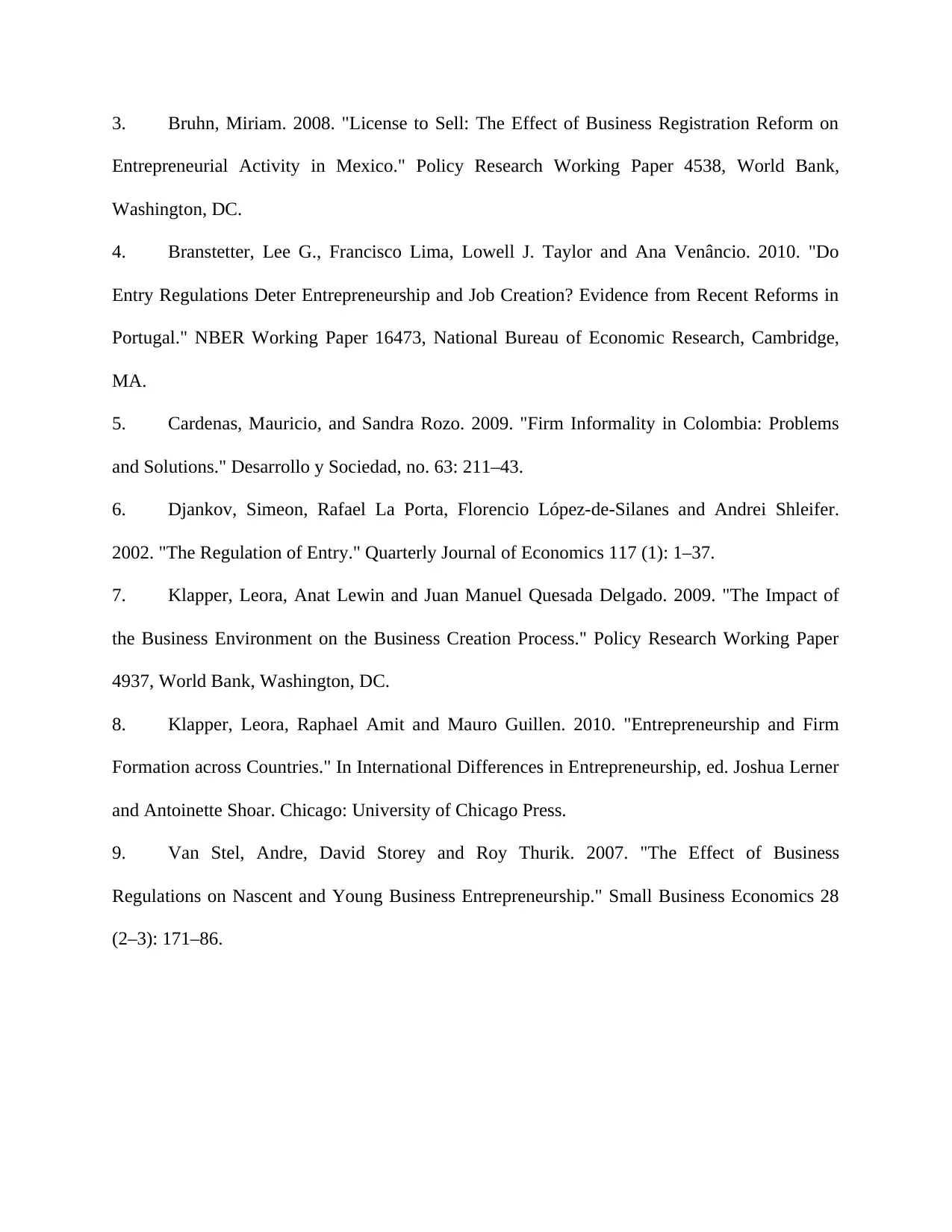
3. Bruhn, Miriam. 2008. "License to Sell: The Effect of Business Registration Reform on
Entrepreneurial Activity in Mexico." Policy Research Working Paper 4538, World Bank,
Washington, DC.
4. Branstetter, Lee G., Francisco Lima, Lowell J. Taylor and Ana Venâncio. 2010. "Do
Entry Regulations Deter Entrepreneurship and Job Creation? Evidence from Recent Reforms in
Portugal." NBER Working Paper 16473, National Bureau of Economic Research, Cambridge,
MA.
5. Cardenas, Mauricio, and Sandra Rozo. 2009. "Firm Informality in Colombia: Problems
and Solutions." Desarrollo y Sociedad, no. 63: 211–43.
6. Djankov, Simeon, Rafael La Porta, Florencio López-de-Silanes and Andrei Shleifer.
2002. "The Regulation of Entry." Quarterly Journal of Economics 117 (1): 1–37.
7. Klapper, Leora, Anat Lewin and Juan Manuel Quesada Delgado. 2009. "The Impact of
the Business Environment on the Business Creation Process." Policy Research Working Paper
4937, World Bank, Washington, DC.
8. Klapper, Leora, Raphael Amit and Mauro Guillen. 2010. "Entrepreneurship and Firm
Formation across Countries." In International Differences in Entrepreneurship, ed. Joshua Lerner
and Antoinette Shoar. Chicago: University of Chicago Press.
9. Van Stel, Andre, David Storey and Roy Thurik. 2007. "The Effect of Business
Regulations on Nascent and Young Business Entrepreneurship." Small Business Economics 28
(2–3): 171–86.
Entrepreneurial Activity in Mexico." Policy Research Working Paper 4538, World Bank,
Washington, DC.
4. Branstetter, Lee G., Francisco Lima, Lowell J. Taylor and Ana Venâncio. 2010. "Do
Entry Regulations Deter Entrepreneurship and Job Creation? Evidence from Recent Reforms in
Portugal." NBER Working Paper 16473, National Bureau of Economic Research, Cambridge,
MA.
5. Cardenas, Mauricio, and Sandra Rozo. 2009. "Firm Informality in Colombia: Problems
and Solutions." Desarrollo y Sociedad, no. 63: 211–43.
6. Djankov, Simeon, Rafael La Porta, Florencio López-de-Silanes and Andrei Shleifer.
2002. "The Regulation of Entry." Quarterly Journal of Economics 117 (1): 1–37.
7. Klapper, Leora, Anat Lewin and Juan Manuel Quesada Delgado. 2009. "The Impact of
the Business Environment on the Business Creation Process." Policy Research Working Paper
4937, World Bank, Washington, DC.
8. Klapper, Leora, Raphael Amit and Mauro Guillen. 2010. "Entrepreneurship and Firm
Formation across Countries." In International Differences in Entrepreneurship, ed. Joshua Lerner
and Antoinette Shoar. Chicago: University of Chicago Press.
9. Van Stel, Andre, David Storey and Roy Thurik. 2007. "The Effect of Business
Regulations on Nascent and Young Business Entrepreneurship." Small Business Economics 28
(2–3): 171–86.
⊘ This is a preview!⊘
Do you want full access?
Subscribe today to unlock all pages.

Trusted by 1+ million students worldwide
1 out of 12
Related Documents
Your All-in-One AI-Powered Toolkit for Academic Success.
+13062052269
info@desklib.com
Available 24*7 on WhatsApp / Email
![[object Object]](/_next/static/media/star-bottom.7253800d.svg)
Unlock your academic potential
Copyright © 2020–2026 A2Z Services. All Rights Reserved. Developed and managed by ZUCOL.





